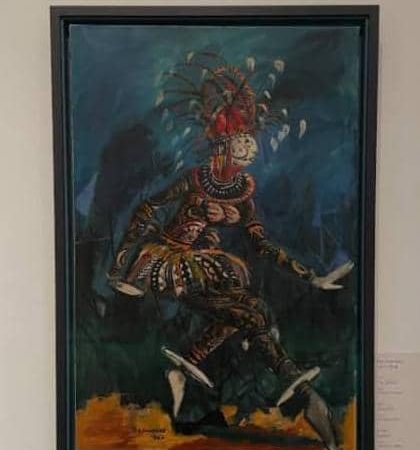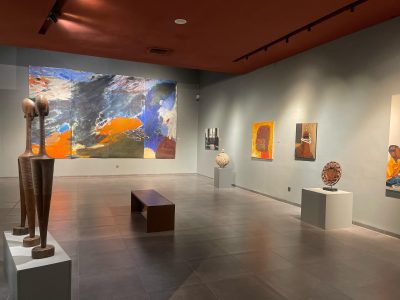The Young Leaders for Arts and Health (YLAH) initiative, created to amplify youth leadership and strengthen youth mental health and wellbeing through the arts, has embarked on a series of global summits.
Running through August and September 2025, the Global Arts in Medicine Fellowship, in collaboration with the Commonwealth and the Commonwealth Leadership Institute, has partnered with government agencies, NGOs, academic institutions, arts and cultural organizations, and youth-led groups across the world to host summits in 18 cities. These gatherings took place in Abuja, Ankara, Atbara, Bamenda, Cairo, Chandigarh, Gaborone, Jakarta, Johannesburg, Kampala, Lagos, London, Louisville, Mendoza, Peshawar, Pune, St-Denis, and Taraba.
Since its launch, the Young Leaders for Arts and Health initiative has connected with an estimated 300,000 people across more than 50 countries through both in-person and online engagement.
Across the 18 summits, young people engaged with themes such as the creative economy, mental health, climate change, war and forced displacement, education, cultural exchange, decolonisation, social justice, youth empowerment, digital literacy, and community building. They expressed these themes through visual art, music, storytelling, spoken word, protest, theatre, drama, virtual reality, and performance showing that creativity is both healing and transformative.
The YLAH summits featured panel discussions, fireside chat, music performance, dance, cultural celebrations and exchanges, networking, story-telling, spoken word, community engagements, workshop sessions among others
The Founder and Executive Director, Young Leaders for Arts and Health and a Commonwealth Award Winner, Kunle Adewale stresses the importance of this global initiative.
“Young Leaders for Arts and Health initiative empowers the next generation by equipping them with essential tools and resources for education, advocacy, community engagement, cultural exchanges, and policy change to enhance their mental health and overall well-being.
Indeed, the Young Leaders for Arts and Health initiative acknowledges the significant role of youth leadership and its contributions to society. The initiative’s premise is rooted in the belief that no one can lead young people more effectively than their peers, which is why the Young Leaders for Arts and Health initiative adopts a youth-centred approach. Recognising the existing generational divide, the initiative aims to bridge this gap to ensure that no young individual is left behind, irrespective of their socio-economic status.
Professor Jonathan Gray, Director, Commonwealth Leadership Institute affirms, “Young Leaders for Arts and Health bring creativity, optimism and real hope – in a time of increasing change and uncertainty.”
Professor Daisy Fancourt, Director, WHO Collaborating Centre on Arts and Health, University College London also remarked: “I couldn’t be more delighted that you, young leaders are taking this work forward. You are the voice of the next generations, hopefully a voice that will recognise, value and champion the arts much more than they are being appreciated at the moment.”
Professor Nisha Sajnani, Founding co-director, Jameel Arts and Health Lab expressed a similar sentiment: “Young leaders, you are shaping the future right now, you bring the creativity, the courage and the vision that we need to build healthier more just society and when you lead with the arts you inspire the world to see culture as a vital force for Health and wellbeing.”
While acknowledging the impact of youth involvement in global development, Lysa John, the Executive Director, Atlantic Institute, Oxford said: “With your creativity and dialogue, you are lighting new paths forward for dignity, wellbeing and inclusion and that’s what is most inspiring. You are not just imagining change, you are inviting others into it.”
In the same vein, the World Health Organization Arts and Health Lead, Christopher Bailey, argued that the power of arts is about connecting with others. He urged participants to strengthen ties with one another to
While highlighting the arts as a means to improve health, former MP and UK Health Minister of State for Community and Social Care, Sir Norman Lamb, observed that arts-based programmes support and may even reduce the need for certain drug treatments, particularly for mental disorders.
The Health adviser at the Commonwealth Secretariat, Janneth Mghamba also cited a World Health Organisation report on the role of the arts in improving health and well being that referenced a Finnish model, among others, as examples of how arts and health can be successfully integrated into national policy. She reinforced the importance of marrying the two, noting:
“Youth-led arts initiatives are crucial for driving health innovation and fostering well-being across diverse communities, offering a holistic healthcare approach that is culturally appropriate and accessible.”
The summits took place at a time when young people around the world were facing overlapping crises. Globally, one in seven adolescents lives with a mental health disorder, and mental health issues account for nearly 45% of the total disease burden among those aged 10–24. Yet, less than two percent of national health budgets are directed to youth mental health (Fancourt & Finn, 2019). Research also shows a worldwide decline in adolescent wellbeing over the last decade, with rates of loneliness, anxiety, and depression steadily increasing (Marquez & Long, 2021).
At the same time, displacement has become a defining reality for youth. By the end of 2024, more than 123 million people worldwide were forcibly displaced and children made up 40% of this total despite being less than a third of the global population. For young people uprooted by war, climate change or instability, the arts have offered a way to process trauma, find belonging and rebuild identity.
Evidence confirms that the arts can make a measurable difference. The WHO’s scoping review showed that arts engagement supports prevention, recovery, and overall wellbeing across populations (Fancourt & Finn, 2019). Furthermore, Longitudinal studies found that young people who engage in creative activities demonstrate stronger wellbeing, self-esteem, and prosocial behavior (Fancourt & Steptoe, 2019). Community-based arts initiatives have also been shown to build resilience and social connection, key protective factors for those experiencing displacement and uncertainty (Sonke et al., 2025).
YLAH was designed to meet this moment by centering youth voices and creativity as tools for both healing and leadership.
At the Commonwealth launch event in London, young participants echoed reflected on the impact they witnessed locally. Build a global community where young people can connect to harness the healing power of the arts for transformation, social change, and inspire healthier communities: bridging cultures, breaking stigmas and redefining wellbeing through creativity and collaboration.
Young Leaders for Arts and Health empowers youth to drive arts-based health innovation, harnessing their unique perspectives to address global health challenges. Through collaboration, mentorship, and cultural exchange, the initiative inspires young leaders to develop creative solutions that promote health and wellbeing in their communities and beyond.



















